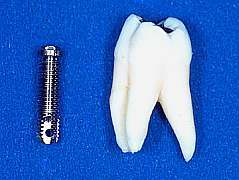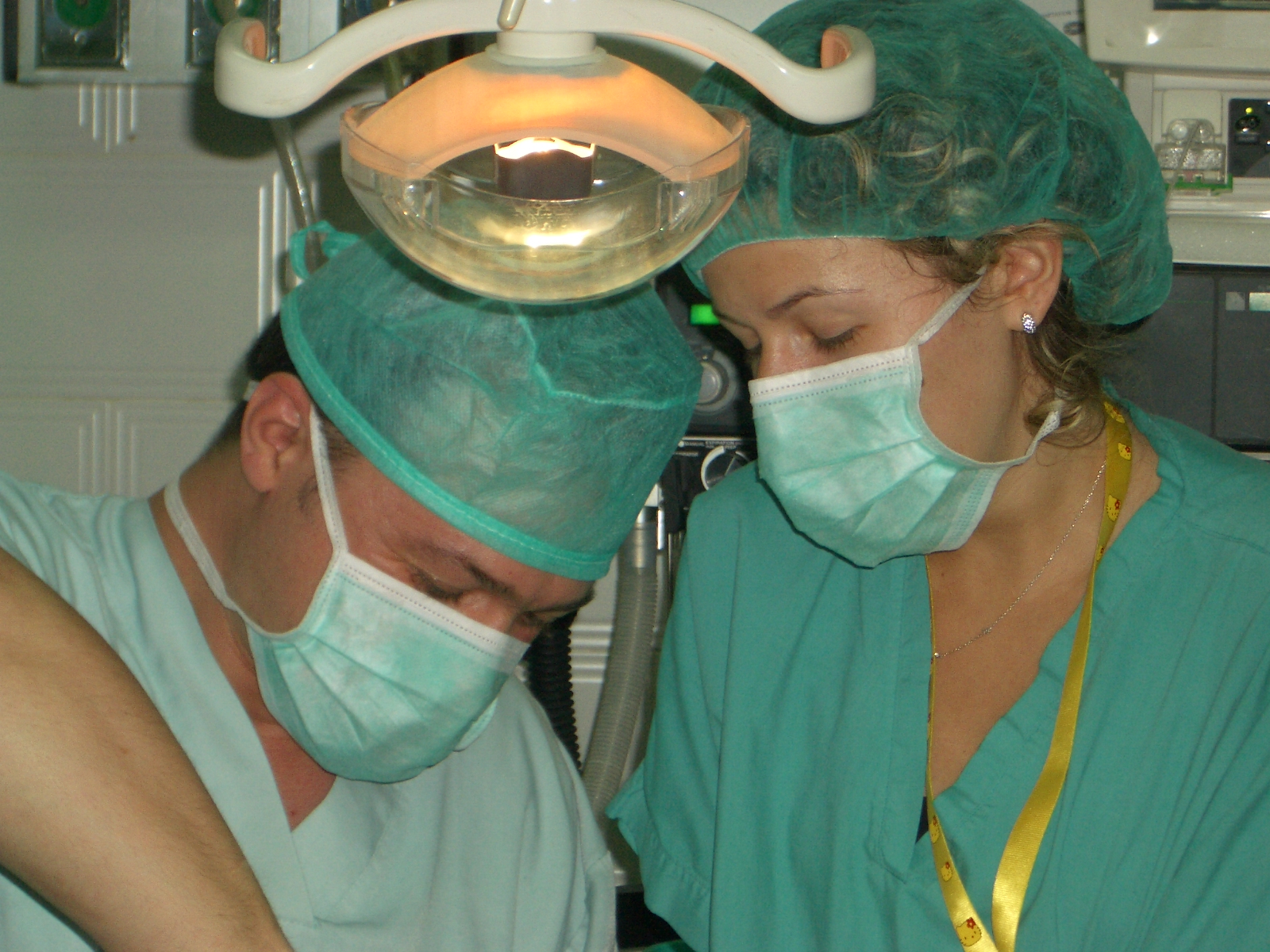| |
Dental implants –how can they help me?

- Single missing tooth restoration without any damage to adjacent healthy teeth
 -
Multiple missing teeth restored – without damaging or overloading the
adjacent healthy teeth
 -
Possibility of installing a non removable bridge restoration,
instead of a removable denture, in cases of totally edentulous jaws
  - Stabilization , retention and reduction of the size of the removable denture .
Stable dentures are necessary for proper digestion , they
prevent gum sores and restore self confidence in
edentulous patients
I lost a tooth. Is the implantation urgent?
What does it mean: Immediate implantation?
  
- Similar to muscles (which lose their volume if unused),
the jaw becomes non active after the tooth extraction,
and suffers from a gum and a bone quantity and quality loss
 
Timely implantation – replaces the lost root, imitates it's activity and as a
result- activates and revives the bone.
Delay will result in loss of the bone volume, the facial muscles will lose
support and the patient will remain with an "old man's face".

Implants inserted immediately following the extraction-
will preserve the bone, and a "young looking" face.
Modern technique called- " Immediate Implantation"-
makes it possible to insert an implant simultaneously
with the extraction.
Immediate Implantation will reduce the treatment period significantly.
What does it mean – Immediate loading? Teeth in a day?
- Immediate loading - Modern technique ,makes it possible to fit
a non-removable temporary restoration on the day of the implantation,
to get rid of the removable dentures and to avoid problems
in the esthetically important zones
Sinus lifting (sinus lift , augmentation)? What does it mean?
  
- A technique which "grows" bone in the posterior part of an upper jaw, in cases
where there is not enough of it for an implantation. Synthetic or human bone
particles are inserted into a maxillary sinus- a cavity above the upper jaw.
After approximately 8 months- new bone develops and the implants are inserted
How many implants will I need?
- Each case requires an individual assessment, depending on a treatment plan,
the quality and the quantity of bone in a particular jaw.

The fact is that a molar (a posterior chewing tooth ) has to withstand a load
of hundreds of kilograms daily and is supported by 3 long and wide roots.
A dental implant which is supposed to replace it – is smaller than a natural
root in every dimension. As a result it has less contact with the bone, and
could be weaker than the natural tooth
According to the up-to-date research it is advisable to insert at least one
implant in place of each lost tooth.
If necessary – it is feasible to reduce the number of implants , but in that case
the non-removable restoration is sometimes not an option. Removable implant
supported denture is a recommended solution in that case. Each additional
implant reduces the load on it's "neighbors" and increases the success rate.
Do dental implants have a 100 % success rate?
- Unfortunately- no one can guarantee a 100% success rate.
Nevertheless modern implantation techniques show a very high
success rate when compared with any other medical or dental procedure.
- Scientific publications claim, that a 5 yr estimated success rate of 98% in the lower jaw and 95% in the upper
jaw is expected in a healthy patient.
Also, according to scientific publications, 85% success rate is expected after 10 yrs.
Is smoking harmful to implants?

- No question about that !
6 or more cigarettes a day will significantly cut the success rate down
and interfere with a healing process.
It's recommended to refrain from smoking 2 weeks before and 2 weeks
after the implantation.
Are there medical contraindications for implants?
- If a person is healthy enough to get his tooth extracted- generally he/she should
be OK to get an implant. Diabetes (uncontrolled) reduces the success rate,
Damaged heart valves or blood coagulation disorders might make it
unwise to carry out implantation. Osteoporosis- is not a contraindication.
In case of a doubt- a relevant specialist will be consulted.
Is there an age limitation for having implants ?

- You can have them from 16 until 120!
Who inserts the implant?

- A licensed dentist, providing that he /she is properly trained and is
appropriately equipped. Some dentists prefer to perform the surgical
procedure only - the implant itself. Others- prefer to participate only in
a prosthetic part- the constructing of the new, implant supported teeth.
Lately it has been noted that if the same dentist is responsible for
both stages-it might be in the best interest of the patient.
Does the same dentist who performs the implant surgery have to build the crown?
-
No, but there are at least 2 situations where it might have an advantage:

In the unlikely event when, after the treatment is completed, complications arise
or re-treatment is necessary – it's not always clear who should take care of it:
the implant dentist or the dentist who built the teeth .
That predicament could be avoided if both stages are performed
" under the same roof"
If the implanting dentist is the one who also builds the new teeth on
them afterwards, sometimes it might be easier for him/her to place the
implants accordingly to the final esthetic and functional design .Likewise
he/she can make changes to the implant location in the course of an operation,
should it become necessary
Should I fight to keep the natural tooth- or have it extracted & replaced by an implant?
- It is important to make all the efforts to preserve and save the natural
teeth. The vast majority of teeth could and should be saved using
modern techniques and materials that we are able to offer now.

Unfortunately, sometimes the damage to the natural teeth is beyond treatment,
and an attempt to keep them in the mouth any longer, could result in jaw bone
loss. One should keep in mind, that the BONE (and not the teeth) is the most
important component of the system and our main goal is to preserve it.
If there is enough bone left - you can insert the implant and restore the missing teeth.
Which implant is "best"?
- There are many Israeli and international implant manufacturers.
The companies use each others experience and most of them show
high success rates. Make sure, that you are offered an implant approved
by American FDA and Israeli Health Ministry .
Can I have a laser implantation?
- There is no such thing (yet), regardless of the advertisements
When will I get my new teeth ?

- Temporary teeth will be received on the day of the implantation.
The permanent restoration- will take 3 to 6 months.
50 yrs ago my grandmother got a regular bridge and was happy with it.
Who needs implants anyway?
-
Regrettably, the technique of damaging and grinding down of healthy teeth is
still a common practice in some countries.
As we see it- it is a big mistake to drill into healthy teeth when it's possible to insert an implant.
As a patient, you are, no doubt, free to choose for yourself a more primitive
way of treatment.
However- in the 21st century, it is considered bad
practice to damage healthy teeth,
if the patient is not presented with the alternative of implantation.
Implantation- does it hurt?
- The treatment is delivered under local or general anesthesia.
Usually there are no considerable side effects or pain.
In rare cases- there is short term minor swelling after the implants.
The patients describe the discomfort as "worthwhile".
Second opinion

-
Frequently different doctors are able to offer different solutions to the same problem.
Your desire to explore alternatives- is reasonable and does not offend your
regular dentist. Your doctor will provide you with all the necessary documentation,
including x-rays.
In our clinic- we consult patients seeking creative solutions- on a daily basis.
|